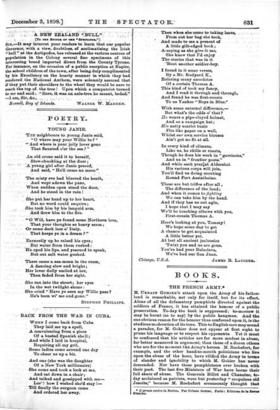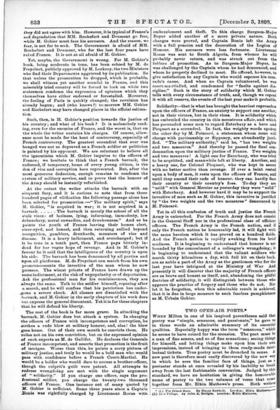BOOKS.
THE FRENCH ARMY.*
M. ITRBAIN GORIER'S attack upon the Army of his father- land is remarkable, not only for itself, but for its effect. Alone of all the defamatory pamphlets directed against the soldiers of France, it has attained the honour of a public prosecution. To-day the book is suppressed; to-morrow it may be burnt (so to say) by the publio hangman. And the one obvious reason for the honour thus conferred upon it, is the studious moderation of its tone. This to English ears may sound a paradox, for M. Gohier does not appear at first sight to prune his language or to respect his opponents. Yet it must be confessed that his articles are far more modest in abuse, far better measured in argument, than those of a dozen others who are for the moment the Army's heroes. M. Rochefort, for example, and the other hand-to-mouth politicians who live upon the abuse of the hour, have vilified the Army in terms of slander and ignobility to which M. Gohier has never descended. Nor have these pamphleteers ever broken with their past. The last five Ministers of War have borne their full share of abuse. The Generals Billot and Chanoine, to- day acclaimed as patriots, were but yesterday " crapulous old Jesuits," because M. Rochefort erroneously thought that • L'Arstis contra is Nation. Par Urbain Goblet'. Paris t Editions de Is Urn Blanche.
they did not agree with him. However, it is typical of France's sad degradation that MM. Rochefort and Drnmont go free, while M. Gohier must face his accusers. And the reason, we fear, is not far to seek. The Government is afraid of MM. Rochefort and Drumont, who for the last four years have ruled France. It is not at all afraid of M. Gohier.
Yet, maybe, the Government is wrong. For M. Gohier's book, being moderate in tone, has been echoed by M. de Freycinet, publicly approved by M. Lockroy, the two Ministers who find their Departments aggrieved by its publication. So that unless the prosecution be dropped, which is probable, we shall witness yet another scandal in France, and this miserably tried country will be forced to look on while two statesmen condemn the expression of opinions which they themselves have either endorsed or forestalled. Moreover, the feeling of Paris is quickly changed; the revulsion has already begun ; and (who knows ?) to-morrow MM. Gohier and Rochefort may have changed places in the official estima- tion.
Such, then, is M. Gohier's position towards the justice of his country ; and what of his book ? It is melancholy read- ing, even for the enemies of France, and the worst is, that on the whole the writer sustains his charges. Of course, allow- ance must be made for the heat of controversy, especially of French controversy. The greatest scoundrel that ever was hanged was not so depraved as a French soldier or politician is painted by his opponent. We are reluctant to believe all the ignominies which M. Gohier imputes to the officers of France; we hesitate to think that a French barrack, the enforced, if temporary, home of every young citizen, is the den of vice and corruption here represented. But, after the most generous deduction, enough remains to condemn the system of military service, and to prove that the honour of the Army should be instantly refurbished.
At the outset the writer attacks the barrack with an eloquent fury, and it is curious to note that from three hundred pages of vilification the following passage alone has been selected for prosecution :—" The military spirit," says M. Gohier, "is acquired in war; it is not acquired in a barrack The barrack is merely the school of all the stale vices : of laziness, lying, informing, immodesty, low debauchery, moral cowardice, and drunkenness." And so he paints the youth of France leaving their homes alert, clear-eyed, and honest, and then returning sullied beyond recognition, gamblers, drunkards, monsters of vice and disease. It is a heavy indictment, and overcharged ; but if it be true in a tenth part, then France pays bitterly in- deed for her vague hope of revenge. And in M. Gohier's favour be it said that the intelligence of the country is upon his side. The barrack has been denounced by all parties and upon all platforms. M. de Freycinet can match from his own pronouncements the invective of the man whom he now pursues. The wisest priests of France have drawn up the same indictment, at the risk of unpopularity or of deportation. Ask the professional man for his reminiscences, they are always the same. Talk to the soldier himself, reposing after a march, and he will confess that his patriotism has under- *one a severe shock. All classes are dissatisfied with the barrack, and M. Gohier in the early chapters of his work does out express the general discontent. Yet it is for these chapters that he will defend his liberty.
The rest of the book is far more grave. In attacking the barrack, M. Gohier does but attack a system. In charging the officers of France with incompetence and corruption, he strikes a rude blow at military honour, and, alas! the blow goes home. Oat of their own mouth he convicts them. He relies not on his own conviction, but on the expressed opinion of such experts as M. de Gallifet. He declares the Generals of France incompetent, and asserts that promotion is the fruit of intrigue. Worse than this, he paints a sorry picture of military justice, and truly he would be a bold man who would pass with confidence before a French Court-Martial. He would be a bolder who would dare to accuse a brother-officer, though the culprit's guilt were patent. All attempts to redress wrongdoing are met with the single argument of " solidarity." If you charge one officer, says the pro- fessional soldier, you charge the twenty-two thousand officers of France. One instance out of many quoted by
M. Gohier is sufficient. Some three years since a Captain Donis was rightfully charged by Lieutenant Rocas with embezzlement and theft. To this charge Surgeon-Major Boyer added another of a more private nature. Both charges were proved, and Captain Bonis left the Army with a full pension and the decoration of the Legion of Honour. His accusers were less fortunate. Lieutenant Rocas was sent to South Algeria, from whence he will probably never return, and was struck out from the tableau of promotion. As to Surgeon-Major Boyer, he was challenged by the Captain whom he had denounced, and whom he properly declined to meet. He offered, however, to give satisfaction to any Captain who would espouse his coin. rade's cause. And when no Captain volunteered, he was court-martialled, and condemned for "faults against die. cipline." Such is the story of solidarity which M. Goblet tells with every circumstance of truth, and, though we repeat it with all reserve, the events of the last year make it probable.
Solidarity—that is what has brought the heaviest reproaches upon the officers of France, an anxiety to support one another, not in their virtues, but in their vices. It is solidarity which has embroiled the country in this monstrous affair, and which has persuaded some men to regard Esterhazy as a hero and Picquart as a scoundrel. In fact, the weighty words spoken the other day by M. Poincare, a statesman whom none will charge with partisanship or flippancy, are abundantly justi- fied. "The military authority," said he, "has two weights and two measures." And thereby he passed the final con- demnation upon the military justice of France. Two weights and two measures ! A light one for Esterhazy, who was tried to be acquitted, and meanwhile left at liberty. Another, and a heavy one, for Colonel Picquart, who was kept in secret with no better motive than revenge. If ever a taint rested upon a body of men, it rests upon the officers of France, and until they amend their code of honour, they can hardly face their country or their country's foes. To-day they are "solid" with General Mercier as yesterday they were "solid'' with Esterhazy. And however hard it may be to support the invective of men such as M. Gohier, this invective is justified by " the two weights and the two measures " denounced by M. Poincare.
Yet in all this confusion of truth and justice the French Army is untouched. For the French Army does not consist in the General Staff nor in the professional class of efficient officers. The French Army is the French nation, and if only the French nation be honourably led, it will fight with the same heroism which it has proved on a hundred fields. And the French nation is rapidly awaking from its brief madness. It is beginning to understand that honour is not bounded by the concealment of a colleague's wrongdoing; it is beginning to understand that the valiant soldiers who march thirty kilometres a day, with full kit on their back, are as noble a part of the Army as the gentlemen who for the last year have intrigued at the Ministry of War. And presently it will discover that the majority of French officers are as brave and honest as itself, and, abandoning the pitiful doctrine of solidarity, it will distinguish between those who approve the practice of forgery and those who do not. Nor let it be forgotten, when this admirable result is achieved, that it is due in large measure to such fearless pamphleteers as M. Urbain Gohier.























































 Previous page
Previous page